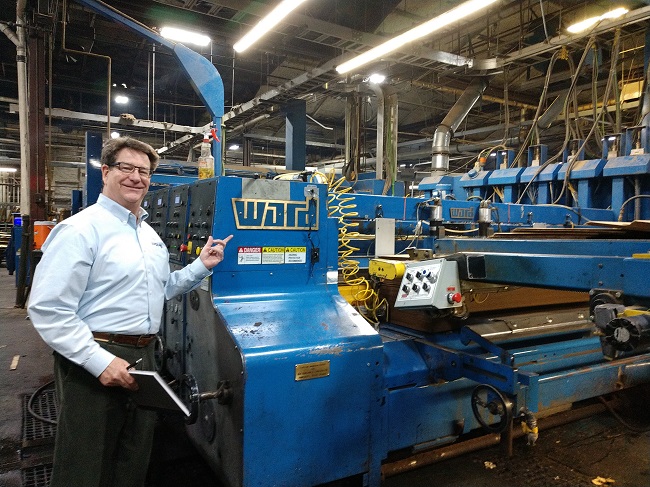
There are resources out there to help maintain worker safety and manufacturing productivity despite COVID-19 cases. For manufacturers who haven’t reached out for a Polaris MEP COVID Facilities Assessment yet, the coming of cold weather may be just the prompt to do so.
Polaris Project Manager Phil Ward said most Rhode Island manufacturers are taking advantage of his organization’s free COVID assessments, but he would like to see more do so.
PBN: What are some common challenges you are seeing in manufacturing facilities when it comes to COVID compliance?
WARD: Since April, Polaris MEP project managers have visited hundreds of Rhode Island’s manufacturing facilities, assessing their response and brainstorming solutions. Manufacturers have really met the challenge. They’re creating distance between workstations, screening employees consistently, providing hand-sanitizing stations and using visual guide signs throughout the plant.
With the colder weather coming, the concern is that for most of our companies, meeting rooms and break spaces are too small to adhere to guidelines. There is no way to maintain the 6-feet social distancing rule without breaking walls. Another challenge is maintaining that distance among employees that carpool together. Now that the weather is colder, it is difficult to keep the doors open for safer air circulation.
PBN: How are you advising companies to handle these challenges?
WARD: The simplest approach is to physically remove some of the chairs in the break room. Then, to create what we manufacturing engineers like to call a visual control – use colored tape to either locate where the chair should be or where the people should sit. That way, at a glance, anyone knows what’s right or wrong.
Workplaces should add signs that state the room’s capacity – things like, “No more than two people at any time” – outside the room with marks on the floor where workers should stand while waiting their turn to enter.
If the room is just too small, it may be possible to take over other spots in the facility as a temporary break room. Or, set up an outdoor break room with portable heaters.
PBN: For PBN readers who may be outside the manufacturing industry, what are we looking at in terms of COVID and downtime, or loss of productivity?
WARD: Even one infected person can have a huge impact on a small company because if an entire team is exposed and must quarantine, then that entire portion of the production line is impacted and could have to stop production completely. It could take a company a month or more to recover from a complete stoppage of the production line.
Last spring, we had a few companies who experienced this challenge. It turned out that carpooling employees contributed to many of the early infections. Even when wearing a mask, you have a high chance of being exposed to the virus in the close quarters of a car. If a carpooler has been exposed at home, they bring that virus with them. Polaris MEP and Rhode Island Manufacturers Association advised all manufacturers to train workers on carpool coronavirus safety protocols.
PBN: What are you seeing in terms of response when it comes to manufacturers seeking out resources, assessments and audits from Polaris and/or RIMA?
WARD: Most manufacturers are open to COVID assessments and have done a very good job at responding to the challenges of the pandemic. About 85% are already fully following the state guidelines. [Another] roughly 10% of companies have proactively asked for our help. They tell us they appreciate the recommendations we provide to keep their employees safer.
I’d love to see that remaining 5% of companies reach out and schedule a visit. We are not a regulatory group. We’re a nonprofit with a mission to help manufacturers. These free assessments can prevent a loss of productivity and help keep their companies open.
PBN: As Polaris visits facilities around the state, are you learning from manufacturers as they learn from you, and sharing this information with other manufacturers in terms of dealing with the pandemic?
WARD: Absolutely, I learn something new every time I go into a new facility. I am always amazed at the different ways people solve problems.
In the beginning, companies were doing their best to interpret the guidelines from the RIDOH [R.I. Department of Health], CDC [Centers for Disease Control and Prevention] and OSHA [Occupational Safety and Health Administration], and it was sometimes confusing. Every manufacturer solved their specific problem with creativity and innovation. The team at Polaris MEP shared what we learned in the field with each other and with any company that needed help in a specific area.
A great example of a simple, low-cost solution was a company that bought dedicated styluses for each machine operator. This meant that they did not need to use their fingers on the touch screen to control their machines. This reduced the cleaning frequency needed and saved on cleaning materials and time. The most important thing? Their workers felt safer.
Susan Shalhoub is a PBN contributing writer.










